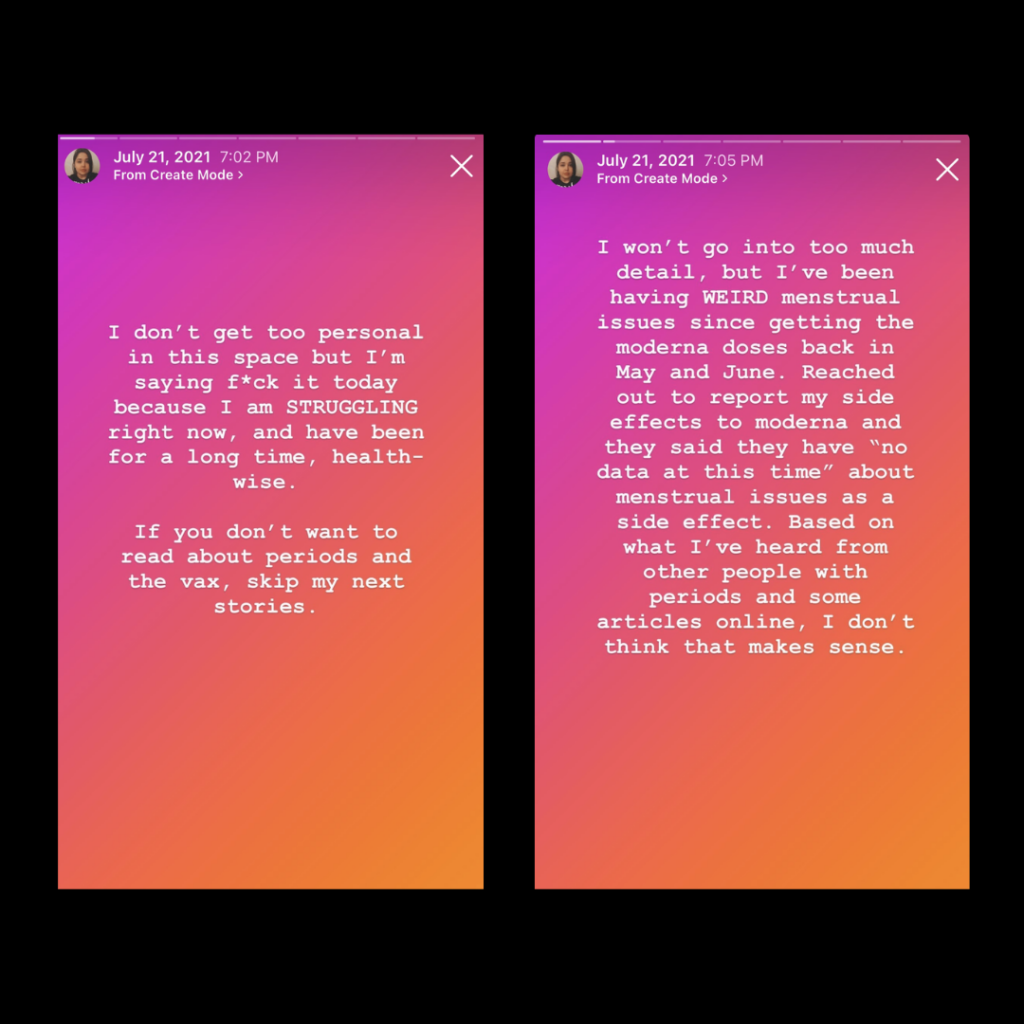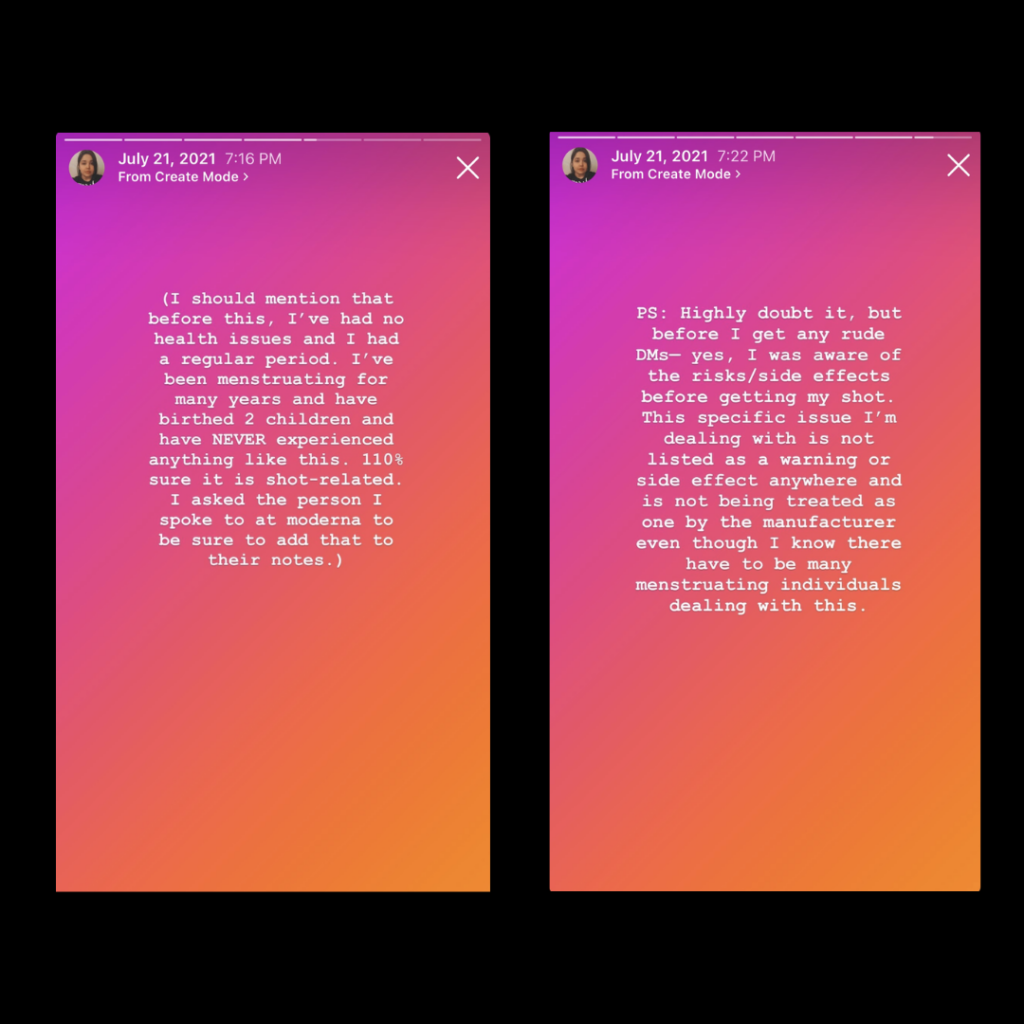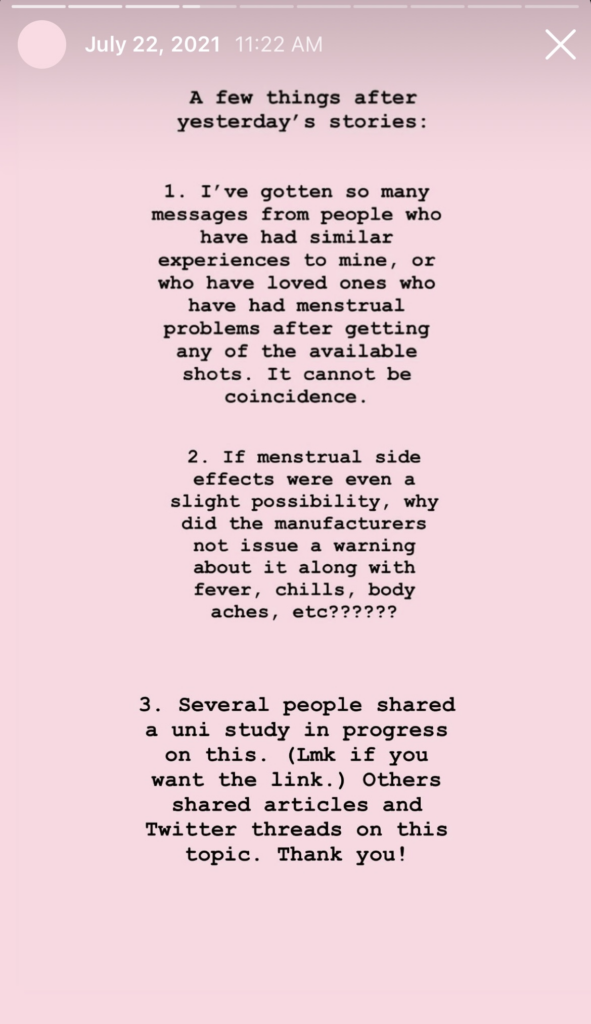Background
Growing up, I never heard anyone talk about periods. I got ‘the talk’ from my mother when it happened for me, but not anywhere outside of that. I never heard open and free conversations about menstruation from anyone. Even my friends at school were incredibly private about it, and particularly skilled at the old pad-in-the-jacket-sleeve on the way to the bathroom trick. This led me to believe that a period was not something to talk about in public.
Fast forward years later. I openly discuss periods with my daughter and son, and even my husband (who wasn’t taught anything about periods, period). I bring up the subject with my sisters and my mom, and sometimes even my nieces. Every now and again I’ll share ideas and resources about periods in my stories online. That’s about where it ends for me.
In recent media, it seems that period talk has become less taboo and more ubiquitous. This spring I discovered period vlogs, where people talk about their period experience in the context of their daily lives. There are so many books out on the subject, both for young adult and adult readers. (Shout out to Steph for pointing me in the direction of some good ones in this post!) These examples of people publicly writing and talking about their periods is moving and encouraging.

Our Red Book by Rachel Kauder-Nalebuff is a people’s history of menstruation across many years and historical events. After talking about periods in-depth for the first time with the women of her family, the author and her mother began compiling a local archive about menstruation. Over the years it expanded to people from across the world, from all kinds of backgrounds (including a doctor whose words helped me). There are stories of periods in all the iterations: first periods, final periods, bleeding after transitioning, missed periods. The author punctuates the stories with anecdotes about how she heard them or how they affected her. It is such an important read.
I’ve never written about my period experiences before. In the vein of being open and free, I’m going to share a period story with you today.
My Period Story
Around this time exactly two years ago, I was terrified. It was June 2021, and I had been bleeding since early May. I thought it was a normal period, because it ended at first. But then it came back, and it kept coming.
After years of my period varying between regular and semi-irregular, I became meticulous about tracking my cycle and health symptoms, and I had it down to a science. I made habit tracker-style spreads and took notes. I kept track of dates. For the most part, I had my pattern set and knew what to expect every month. So when this weird period started, I struggled with trying to figure out what was going on. The only out-of-the-ordinary thing that had occurred at the time was that I had just gotten my COVID-19 vaccine, which had just recently become available. I was convinced that that had to be what was throwing off my cycle. At the time I was vaccinated, however, possible changes in menstruation were never mentioned.
Although this had never happened to me before and I was a little (read: very) alarmed, I did my best to deal with it. I was grateful for the lighter days and did my best to make healthy choices to help mitigate the continuously heavy flow. Sometimes it stopped for a short time. I had hope that it would end soon.
Then things got much worse. My flow became so heavy that I was going through two packs of pads a week. The bleeding was affecting my daily life; it was hard to make plans and go out because my days revolved around the bathroom. I struggled to take care of my children and myself, much less get work done or manage household tasks. Some days, I felt like my life was about picking a place to sit and bleed. When I felt my absolute worst, I’d sit in my bathtub with the water running and just cry.
Reaching Out
Come mid-July, I’d had enough. I called the manufacturer of the vaccine I got and filed a report. I wanted to talk about it online. I’d never talked about my period with people who are not family, much less on Instagram. It had always seemed an uncomfortable thing for me to do, although I’ve always admired people who are so open about these topics on social media. I figured that the discomfort of being vulnerable and asking for help was much better than struggling with the discomfort of bleeding for two months straight.
Here are screenshots of what I shared below:



Before this, I’d never shared anything this personal online before. I’d never felt more exposed to strangers in my life. However, much to my surprise, I was quickly flooded with messages of support and resources. People openly shared their own period experiences with me. I was honored. The heaviness I’d been carrying mentally and emotionally lifted, and I was able to figure a course of action for myself.

I did not (and still do not) have health insurance, but I eventually went to the doctor. (That is a story about the lack of support in women’s and reproductive care, but I’ll save that for another time.) After two and a half long months, the bleeding finally stopped. Relief doesn’t even begin to cover what I felt when it ended. Since then, nothing like that has ever happened to me again. Right now, I can practically set a clock to my period. (I often marvel at my body’s signs of my period coming, but that is also a story for another day.) It feels good to feel in-tune with my body again.
Final Thoughts
Now, years later, there are over 5,000 Google results about abnormal periods after the vaccine. It was apparently a very common thing that people went through during that time, although there was no literature on the topic then and it wasn’t mentioned at the time of the jab. (Other side effects were mentioned, but nothing having to do with menstruation.) This topic even comes up toward the end of Our Red Book. The author points out how “medical researchers have historically regarded menstruation as a confounding variable, too unwieldy to make sense of.” In an interview with a doctor, it was also pointed out how simply mentioning the possibility of periods being affected would have saved people from so much confusion and fear. (YES!) My experience is just one of countless that women and menstruating people go through with little to no support from health care providers because of this lack of research.
Since this happened to me two years ago, menstrual research seems to be inching very slowly compared to other areas of innovation. However, the severe restrictions on reproductive health and abortion rights since late 2021 and leading up to the Supreme Court’s June 2022 overturning of Roe v. Wade negate what little progress has or could ever be made in such research, in my opinion. More than ever, it feels like we’re going backwards. Where is justice? Why is it too much to have full autonomy over our bodies? Why is it too much to expect medical research to care about women and minority groups?
One thing we can do today is start by talking about these things with our families and our communities, in person and online. I wish I had something more uplifting to end with, but I just have a book list.
Books about periods and reproductive justice:
Period Power: A Manifesto for the Menstrual Movement by Nadya Okamoto
You Can Have a Better Period: A Practical Guide to Calmer and Less Painful Periods by Le’Nise Brothers.
Perimenopause Power: Navigating Your Hormones on the Journey to Menopause by Maisie Hill
Pain and Prejudice: A Call to Arms for Women and their Bodies by Gabrielle Jackson
Ejaculate Responsibly: A Whole New Way to Think About Abortion by Gabrielle Stanley Blair
The Pain Gap: How Sexism and Racism in Healthcare Kill Women by Anushay Hossain
Controlling Women: What We Must Do Now to Save Reproductive Freedom by Kathryn Kolbert and Julie F. Kay

